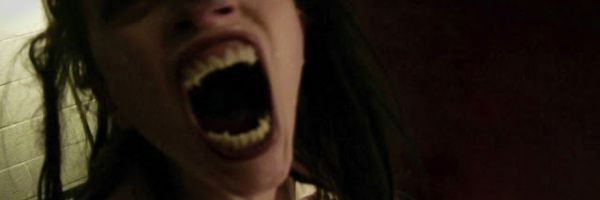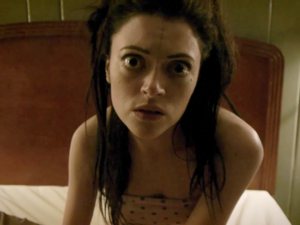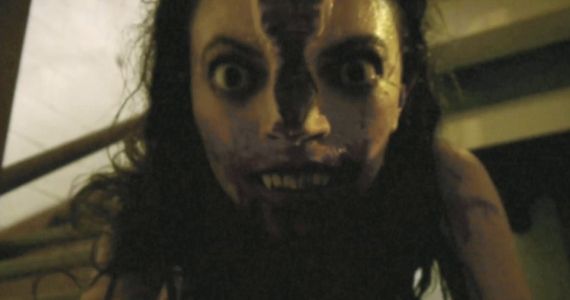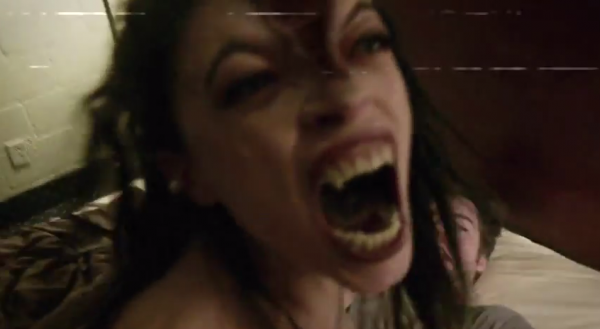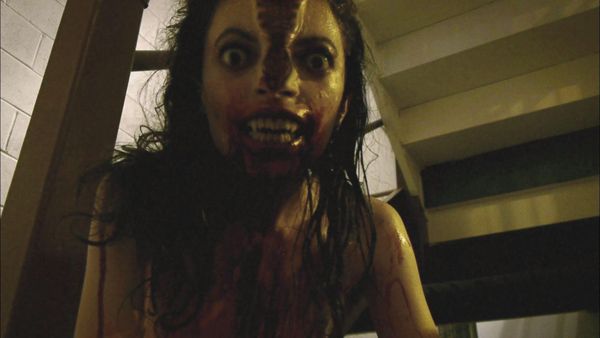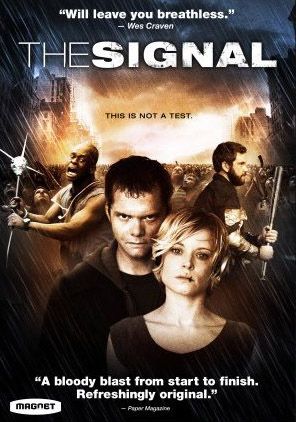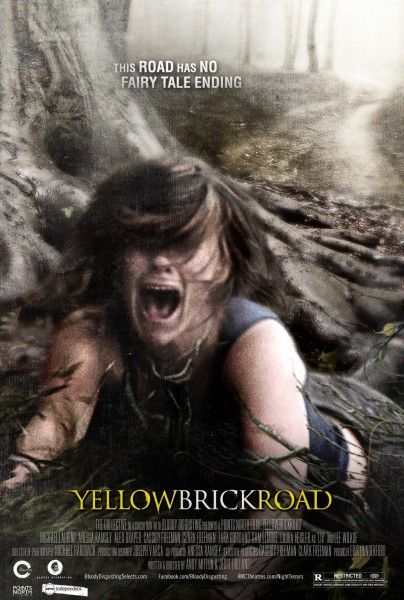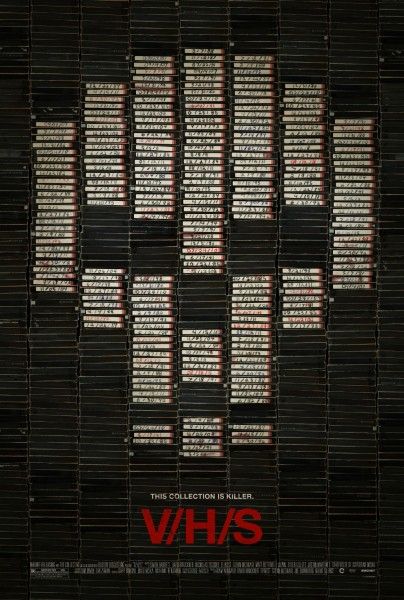V/H/S is the latest release to capitalize on the found-footage craze. The anthology film is structured around a group of criminals who are hired to break in to a desolate house and retrieve a mysterious videotape. When they arrive at the house they find the owner dead in his recliner, facing a stack of TVs and a massive pile of videotapes. In order to locate the correct video they begin watching the tapes one by one, each being a segment in the film. These shorts include new interpretations on a monster, a masked stalker, a killer in the woods, a ghost story and some good ol’ Satanists; effectively providing a snapshot of the horror genre. V/H/S is directed by Adam Wingard, Ti West, David Bruckner, Joe Swanberg, Glenn McQuaid and newcomers Radio Silence.
During the press conference for the film, I was able to sit down for a one on one phone interview with David Bruckner, writer/director of the segment “Amateur Night”. During the interview we discussed the inspiration behind the creature in the film, what affect the found footage format has on audiences, and the challenges attached to working in that format. In addition, we also talked about what we could expect from a sequel to The Signal, how digital has shaped him as a filmmaker, and a lot more. Hit the jump for the full interview.
So I have to say I thought V/H/S was pretty cool, and I really, really liked your segment.
BRUCKNER: Well, thank you.
Yea, I watch a lot of horror movies, and not a whole lot gets to me, but something about that creature you guys came up with really got to me and made me feel ill at ease.
BRUCKNER: Oh, awesome. It’s been great that some people are really responding to it.
I find her to be a really interesting creature because she doesn’t seem to be anything too specific that we’ve seen before, and she doesn’t even necessarily seem evil. Tell me a little bit about the genesis of the creature and the character.
BRUCKNER: Well, I think the way we approached it, my writing partner Nick Tecosky and myself, I guess the humorous elements of it are really the draw for us. We sort of think of it as an eternal joke about the male gaze, about whether or not pornography has an influence on the minds of young men especially with how prominent it is right now. And we knew that we wanted a creature that was sort of a terrifying representation of a powerful female force in the minds of men. It started with the idea that it was something demonic, but she really took on her own shape and form as it made sense to the story for us. So she’s definitely not something specific, we’ve really enjoyed people’s take on what she is. We’ve heard everything from cat lady, to succubus, to vampire, to dragon. We’re sort of fascinated with the fact that so many people are interested in assigning a mythology to her. I will say that we did come up with a story for her on our own that made sense within the movie, but we promised never to really completely reveal it, it was more just so we had a place to work from so that her performance, Hannah [Fierman]’s performance wasn’t abstract or didn’t fall into cliché. We wanted it to be coming from something specific even if we never tell you what it is.
With both the sex and the violence, you were really unafraid to go some very uncomfortable places. Things just get worse and worse, and never let up. How did you go about building that tension?
BRUCKNER: Well I think part of the fun thing about making a POV movie where the characters are trying to make a sex tape, is that you get to implicate the audience in their efforts. So if you’re watching this movie, depending on whether or not you can relate to these guys at all, you know that certainly has an effect on it, but overall you are forced to be a part of this team making this sex tape. And that pisses some people off. I think when it works the best it just induces a sense of anxiety in the audience. I think we maybe feel a little guilty participating in this, like we shouldn’t be watching it at all. Where the sexual politics ended up was also designed to make us all as incredibly uncomfortable as possible. Giving you a little bit of what maybe you want to see on some level, but you know that you shouldn’t. It’s a very conflicting set of emotions, and if we can become involved in that then the idea is we’ll be nice and primed so that when the violence happens it will have more of an effect.
What do you think makes the found footage genre so successful?
BRUCKNER: I think that as meta my movie geek friends and myself like to get about movies, maybe you can relate to this, we spend so much time in this sort of postmodern haze wrapped up in the 80’s now into the 90’s, constantly looking back on things and making content about other content, that sometimes we realize that we’ve gotten away from just that simple immersive experience just that wonderful thing that movies can do, which is take you somewhere that you don’t get to go in real life. Take you to the edge of the cliff. And for whatever reason, found footage and mixed media approaches, I even think reality TV in a way, I think that all these new subgenres or styles, however you want to look at it, really get us back to the simple sensation of having an experience, and that whole visceral quotient. I think it’s really fun to go there. I think it’s really fun to mix those ideas with a film that can comment on something and offer us a perspective on an existing anxiety. That’s not to say found footage movies should just be immersive experiential, but that that’s definitely part of the strength of them. Why that’s having an effect on our psychology, I don’t really know to be honest. I’m kind of perplexed by it myself. I don’t know why seeing something through a video format puts me closer to it than seeing it in a perfectly composed, movie proper, god’s eye omniscient camera, the way we’ve kind of grown up watching movies. I don’t really know what that is, but it’s definitely playing on our psychology in a really interesting way. And I don’t think it’s going to go away. I think its going to transform into- it’s going to find a new home in different genres. I think we’re going to see it applied in different ways.
Are there any found footage movies in particular that have affected you?
BRUCKNER: I think I’ve gotten something out of every single one of them I’ve seen, I really, and I mean that. There were moments in Cloverfield, Troll Hunter, I thought The Last Exorcism was incredibly effective, I thought the Paranormal Activity movies were effective. There were things- and you know I obviously went back and watched Blair Witch before we did V/H/S and I just thought it was fantastic, I was completely blown away by it. I forgot how good that movie was. I think all those movies had, at one point or another, the ability to just place me in that situation and just get me closer to the experience of running for my life, or being trapped in a situation I couldn’t get out of, and the emotional component of that was so powerful that I was excited to play with it. That being said there’s a lot of pitfalls of found footage too. I mean there’s a lot of tough stuff that comes with it that I think we’re all trying to iron out. The obvious one being why are these people still filming? Which, of course, that just pulls you out of the movie. If you’re thinking that in the middle of it’s actually counterproductive.
You guys actually did a really good job of avoiding that in your segment by putting the camera in his glasses, because I would think at a certain point the camera would be something he was no longer thinking about.
BRUCKNER: Yea, but I mean it’s weird, because you’re still sort of locked in the camera justification. You know, it created other problems. So we got over the fact that he might be recording the situation, but you could argue that the character wearing the glasses is the protagonist of the piece, and one of the problems we ran into was transferral of empathy. Because even though we get to be him and almost as if we’re playing a video game, we get to see what he sees, we still have to see his face to transmit our empathy. We need that; we still have to participate in that process the way that movies have taught us over the years. So we had to write in scenes where he bring himself in the mirror and gives himself a pep talk, just so you could identify with where he’s at. If you don’t understand that he doesn’t want to be there in that situation and this is motivated by peer pressure then you’re liable to completely disconnect from him and the experience and just not get it at all because you’re so offended. So it’s always, I think the fact that the camera has to exist diegetically is always going to create some strange problems. I think what’s really interesting about found footage, if you think about movies like whatEnd of Watch is doing right now, and what District 9 did is creating a flexible place for us to enjoy found footage where it can kind of move in and out of that aesthetic without justifying itself. And if the audience can get to the point where they can forget, where they don’t need clarification, I think it gets real interesting.
So V/H/S is a pretty collaborative movie, and your last film The Signal- which I am a huge fan of, it’s just a crazy underrated movie - but it was also very much a product of collaboration. How do you think the collaborative element shapes you as a filmmaker?
BRUCKNER: It’s really, initially, I think Jacob Gentry and Dan Bush, and Alex Motlagh the producer on The Signal, I think all of us kind of coming up and working on each other’s films, and there was a larger community in Atlanta around us. Everybody was just making stuff after DV got cool and you could do things easily. I think it’s just born out of necessity. I look at a lot of young filmmakers now and these kids in their early twenties who are able to go out and shoot tons of awesome looking stuff on DSLR and then they’re able to build an audience online on their own. I think that’s fantastic. I think the best way to make movies is to fall down and pick yourself up, try again. You have to fail and you have to fail in front of people to know that you’re failing. You have to feel the audience get bored with what you’re doing so you can change your tactics and try something else. You have to ride that whole thing out. We had a film series in Atlanta for a long time that granted us that opportunity. Now that were moving on to other things, I think that really was our film school experience. For me it also means that quite often the whole auteur notion, that it’s my way or the highway, or this is a completely singular vision from one filmmaker, you know, that doesn’t have a lot of leverage in environments like that. If you can’t communicate why something works, if you can’t inspire the people around you to get behind you on a crazy idea, if you can’t articulate it to other stubborn creatives around you, who are not divided so clearly by rank, then your idea won’t survive. I don’t know, that’s just been our experience. That being said I’m certainly excited to make my own feature.
[Laughs] I’m sure. Going back to The Signal for just a minute, I heard that you guys actually wrote a full sequel. Is there anything you can tease about what that might have been like?
BRUCKNER: Oh, yea, you know I think the other guys would be completely comfortable with me talking about this. We wrote a sequel that we were very proud of, that picked up the moment that the original movie ended and actually took us back to the night the signal was first introduced, and brought some new characters into the fray, and eventually intertwined them with the characters from the first movie. So there were even more competing perspectives. We were going to really update the style of the first one. The first one was such a slapdash production, like we were really, really making that one up as we went. I think with the sequel we were very excited to do three perspectives again, but structure it in a way where they were intertwined and maybe built more momentum to a singular thread. You had maybe not as fragmented of a plot arc, but you still had the fragmentary sensation that you got from the first movie, which we thought was one of those really happy accidents that made the movie unique. I don’t know if that movie will ever exist.
Well, I certainly hope it does.
BRUCKNER: Oh, yea it would be so much fun to make. Plus, The Signal’s conceit, I still haven’t seen anyone really do that, you know, the way it was carried out. It feels like there’s a lot more stories that could be told there.
I completely agree. Do you have anything that you’re working on now or hoping to work on in the future?
BRUCKNER: I have a bunch of stuff that I’m working on. My writing partner Nick Tecosky, who came up with “Amateur Night” with me, we’ve got some pieces that we’re working on in the horror vein that we’re very eager to get going. Kind of carrying on where The Signal and even “Amatuer Night” flirts with, just new anxieties brought on by shifts in technology. That’s just very interesting to us. And Jacob Gentry and I, Jacob did the middle portion of The Signal, we’ve got some new apocalyptic pieces that we’re working on and developing at this moment. And V/H/S has been really great to me and I’ve been fortunate to meet a lot of people and participate in this movie with all these incredibly prolific filmmakers that I admire. So that’s definitely opened up a lot of possibilities. So I don’t know what’s going to be the next one to go, but I’m very eager to get on set as soon as possible.
That’s awesome. Since its October, is there any particular movie you like to watch to get in the Halloween spirit?
BRUCKNER: I don’t know. I don’t know. It seems like the last few years I’ve been so busy on a project I completely miss out on Halloween. There’s some really incredible live action haunts in Atlanta every year. There’s one called The Zombie Apocalypse where you can actually shoot zombies with paintball guns.
BRUCKNER: And there’s the classic Underworld adventure up there. I’m looking forward to diving into some of that, the live action immersive stuff. That being said, it looks like there’s a bunch of cool horror films coming out in October, you know V/H/S included, also Sinister which I saw at SXSW, which is great. So I’m excited for a scary month for sure, and I actually have some time this year, so I’m psyched.
Have there been any horror movies from the last few years that really impressed you?
BRUCKNER: I think the one I keep-these questions come up a lot and the one that, the little sort of sleeper project that I just discovered by word of mouth was Absentia. It was just fantastic. Mike Flanagan is the director; I just think it’s fantastic. It’s got a real, there’s almost a Lovecraftian element to it, and it’s that, you know you’ve got characters reckoning with universal forces of the unknown. And they’re always slightly outside of your reach, and if you can tap into that kind of dread and uncertainty I think that makes for really great horror; and I just thought that was a wonderful outing. That one stuck with me. Obviously Cabin in the Woods was amazing. Sinister was great. I’m eager to see The Loved Ones. There’s been some others too, but they’re not coming to mind at the moment.
I mean, it’s not the best time for horror right now, but there’s been some under the radar stuff that’s been pretty interesting.
BRUCKNER: What have you seen that has affected you in that way?
Oh, well, the movie had a lot of flaws, but I was pretty emotionally messed up by YellowBrickRoad. With-
BRUCKNER: Oh, yea, with Anessa. Our friend Anessa from The Signal is in that.
Exactly.
BRUCKNER: There’s some sequences in that movie that are incredibly insane. I think the moment in the woods when the two characters eat the trip berries. That sort of lack of control is absolutely terrifying to me. And it’s like a dangerous watch, because it’s playing with your sense of sanity when you’re seeing it. You feel completely disoriented watching it. That was one section of the movie that affected me in particular; I don’t know how long they can sustain that emotion. Yea, that’s a very original horror flick I’m glad you mentioned that.
I did want to ask you, I read that you’ve never shot on film. Is that something you’re interested in doing before the option completely disappears?
BRUCKNER: I don’t know, I mean, sure. This is blasphemous, but it’s not the biggest deal to me. Just coming up in video, it’s a tool like any other. I definitely went through a wave in digital where I could answer any question you wanted to know about any digital format. You know, what the camera meant what the strengths and weaknesses were. Once HD really took off, and once the RED cam came into existence, and we got a chance to play with that and all its strengths and weakness as they relate to filmmaking. I just got to a point where I’m glad there are cinematographers out there who know more about this stuff than I do. Victoria Warren, who shot amateur night, I’ve been able to work with great people like her who take a lot of those considerations of my plate. And I get to sort of create a look without getting too technical, without needing to interact with the technology in such a specific way. We just experiment, we find things. So I think for me playing with a film camera would be really interesting, shooting in 35 would be great, but I have just as much fun playing in new digital formats. It just depends on the project. I’ve never even had like super 8 film school experience, you know?
Do you think that shooting on digital has any particularly noticeable affects on what kind of movies you make?
BRUCKNER: I definitely think that, in the same way that budget has restricted us, we’ve definitely had to come up with ideas that make aesthetic sense. Like I think shooting a civil war period piece in DV, I was cinematographer on a movie Pyschopathia Sexualis that my friend Brett did, and we shot that on a DVX100 and it was you know, there’s some really great concepts in that movie, but one of the struggles was that there’s nothing I can do that will make this format feel like a period piece. It’s like we’re never going to get there in a way. I think definitely the immediate nature of video, seeing it in a contemporary context. And again I think all the things that I’m interested in doing have something to do with the pace of technology and the fact that it’s totally outrunning our culture and that were all kind of overwhelmed by it. So video seems to feel right in that context. It definitely lends something to the immediacy of it, but for me I think for anybody, its more just something were discovering as we go along. Our world looks more and more like this context that were seeing whether or not we want to admit it or not.
Thank you David, it’s been awesome talking to you.
BRUCKNER: Yea, thank you so much. And thank you for, you know, bringing up The Signal and everything.
Totally. Thanks for making it.
BRUCKNER: Cheers, Good to talk to you.

